
Date: 2025-01-15 Page is: DBtxt003.php txt00011314
PEOPLE
GreenBiz ... 30 under 30s
2016 GreenBiz 30 under 30s ... profiles
Burgess COMMENTARY
Peter Burgess
The 2016 GreenBiz 30 under 30

GreenBiz ... Sureya Melkonian
Corporate sustainability professionals take many paths to the job, and their jobs take many forms. Most aren't on the C-suite track; some aren't even on the CEO’s radar. But that doesn't mean they aren't making a difference.
These emerging leaders, all of them twentysomethings, are tackling some of the toughest challenges in business, from inside big companies, at the helm of startups or in the nonprofit sector. Whether they're already seasoned and celebrated, or just seeding a standout career, watch them grow from here. A desire many of our honorees expressed: for sustainability to be part and parcel of how every business operates.
Here, in alpabetical order, are 30 of today's — and tomorrow's — best and brightest.
|
Elizabeth Barthelmes, 27
Sustainability Manager, Etsy; Brooklyn, New York | ||

|
Elizabeth Barthelmes, Etsy
Elizabeth Barthelmes credits a seventh-grade science project as the inspiration for her career. The focus: researching fly-ash contamination in Wenham Lake, a reservoir north of Boston that was once so renowned for its purity that Queen Victoria purportedly used it as a source for ice. The lax regulations and corporate policies that led to its deterioration got her interested in environmental law. She refined that focus during her junior year at Boston College as a student delegate to COP15, the United Nations climate meetings in Copenhagen. 'Everything kept pointing back to the business world being able to make changes quickly,' she said. Barthelmes’ first job centered on employee engagement for financial services firm Sungard, now part of FIS. She made the leap in May 2015 to Etsy, where she focuses on helping the craft marketplace pursue a Living Building Challenge Petal Certification. Barthelmes also found the time to create a local forum for discussing sustainable business best practices, the New York Area Sustainability Group. That community has mushroomed to more than 300 members. 'On a personal level, I’m proud that I’ve learned to have hard conversations with a lot of diverse stakeholders who don’t always believe in sustainability,' Barthelmes said. 'Or if they believe it, don’t quite understand it yet.' | |
|
Kelly Elizabeth Behrend, 27
Director of Strategy and Sustainability, RIDE; New York City | ||

|
Kelly Behrend, RIDE
What does installing solar panels in Caribbean nations have to do with an app that brings carpooling into the 21st century? If you ask Kelly Elizabeth Behrend, who leads sustainability at the on-demand commuter carpooling company Ride, both approaches have a starring role to play in the transition to a clean economy. 'In college I was quite the hippie,' said Behrend, who started her career with the nonprofit Peacework after graduating magna cum laude in international studies at the University of Richmond. 'The more that I got into the social side, I realized how much the environment is impacting communities around the world.' Behrend considers her strength 'social impact strategy,' working to meld her nonprofit roots with a business mentality to make sustainability a focal point of private-sector endeavors. The transportation sector's disproportionate contributions to climate change — 14 percent of global greenhouse gas emissions as of 2010, according to federal estimates — made Ride an appealing venue for Behrend to put that sentiment into action. 'If you get the right sustainability-minded people into roles around strategy, that’s when we’ll see the needle start to move,' she said. | |
|
Patrick Bloss, 26
Mechanical Quality Engineer, Apple; Cupertino, California | ||
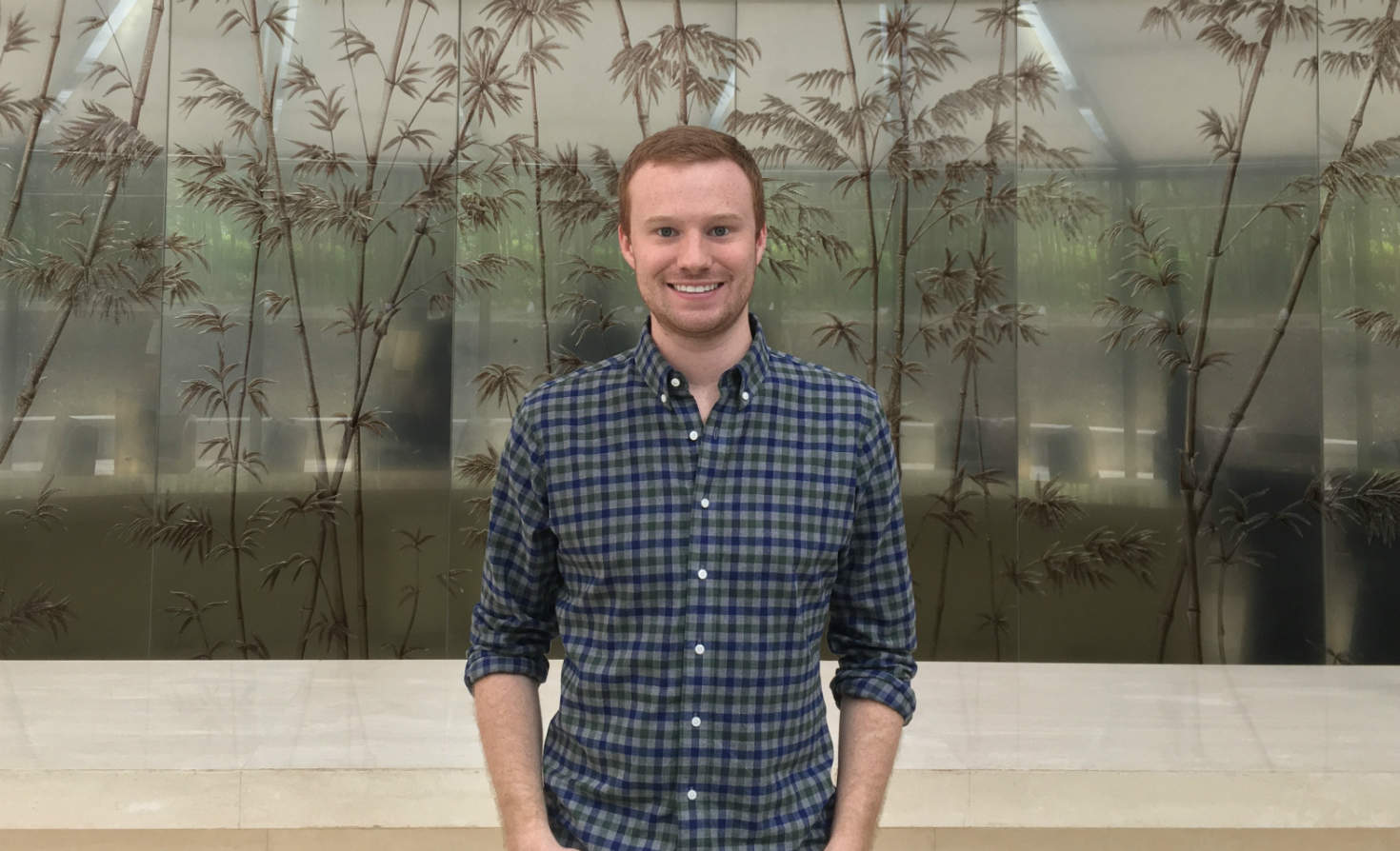
|
Patrick Bloss, Apple
Brand new on the job, Patrick Bloss figured out how to streamline manufacturing of transmission components at a Ford Motor factory to reduce scrap costs by 46 percent. He then developed a process to extend tool life eightfold, and drove the welding operation to achieve its first 100 percent quality audit score. Those results attracted attention beyond Ford. Indeed, Apple recruited him this month. Days before publication of this list, he spoke to GreenBiz from Shanghai, his first trip on official business with Apple. The Fort Wayne, Indiana, native understands that efficiency means cost savings — in an uncanny way that belies his 26 years-of-age and few years in the business world. 'Efficiencies are beneficial all around and really cost driven,' says the mechanical engineering graduate from Purdue University. So on his assembly lines at Ford’s Sharonville, Ohio, plant, 'I looked at where the process was losing money and that led to where inefficiencies were.' 'As my generation starts to move up in companies, sustainability will turn from a single arm of an organization to this kind of thing that is pervasive through an entire company,' said Bloss, who names his mother, a controls engineer, as his biggest influence. | |
|
Sasha Calder, 25
Corporate Social Responsibility and Engagement, Josie Maran Cosmetics; Hollywood, California | ||
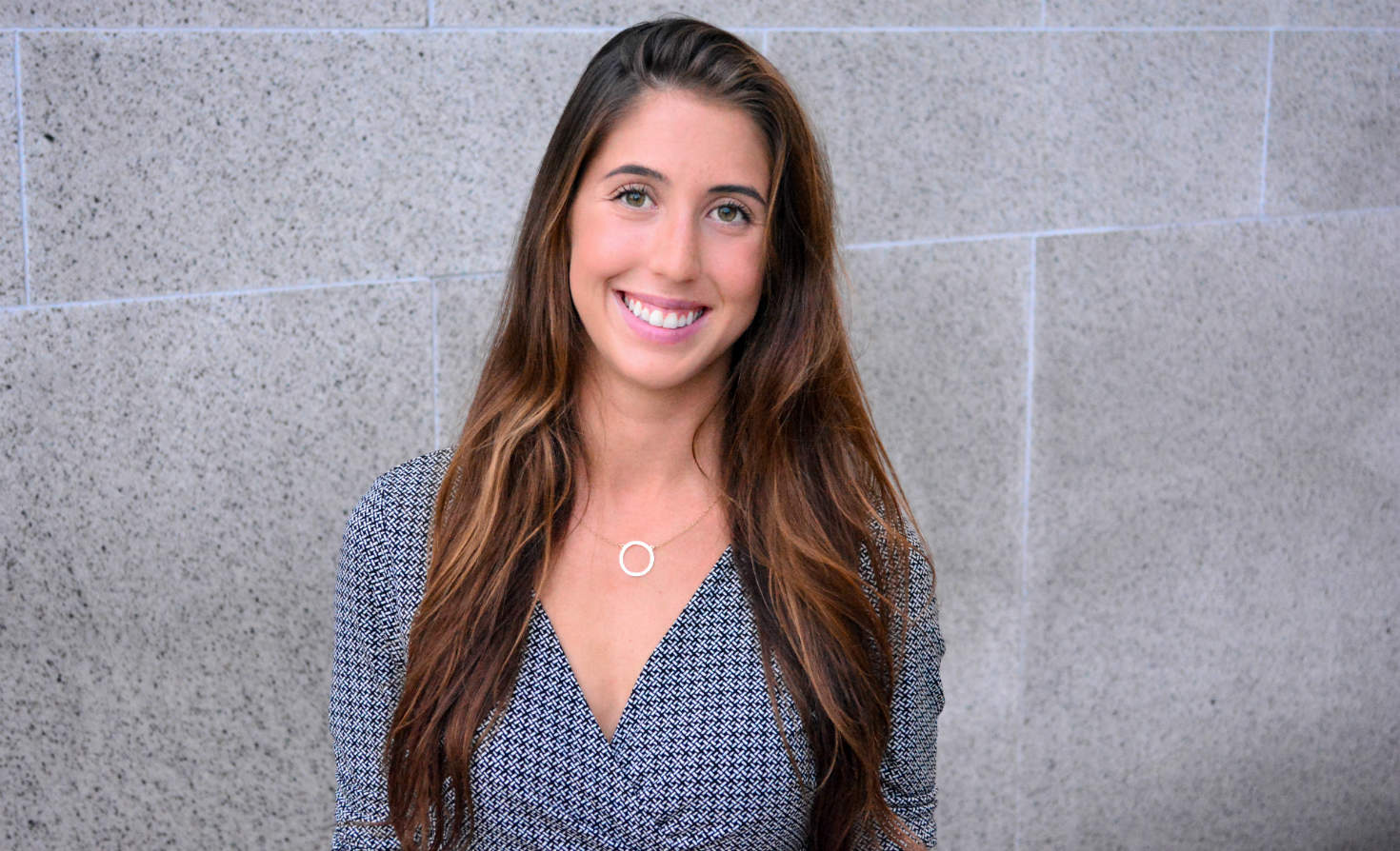
|
Sasha Calder, Josie Maran
At luxury cosmetics brand Josie Maran, Sasha Calder leads social and environmental sustainability programs. That includes sourcing argan oil from women-owned cooperatives in Morocco, then designing low-waste product formulations and packaging. She’s also charged with creating a brand strategy to rethink beauty as a healthy and empowering force. Calder is heavily engaged in Josie Maran’s 'Reinventing The Planet' fund, a $100-million strategy that reinvests cosmetics earnings by partnering with initiatives around women's empowerment, climate change and social entrepreneurship. She envisions her role as 'being the voice of intentionality in the room' that encourages coworkers to understand what it means to produce and sell a socially responsible, environmentally sustainable product. Having parents who left apartheid-era South Africa for Los Angeles, Calder said she developed an early awareness of 'structural inequality.' She studied cultural anthropology and finance at U.C.-Santa Cruz, and holds a Masters degree from the U.N. Mandated University for Peace. 'I think that the younger, '30 under 30' voice is one that is committed to radical hope and optimism in a way that we haven’t seen before in the corporate space,' Calder said. | |
|
Chris Castro, 27
Community Energy Manager and Advisor, City of Orlando, Florida | |||
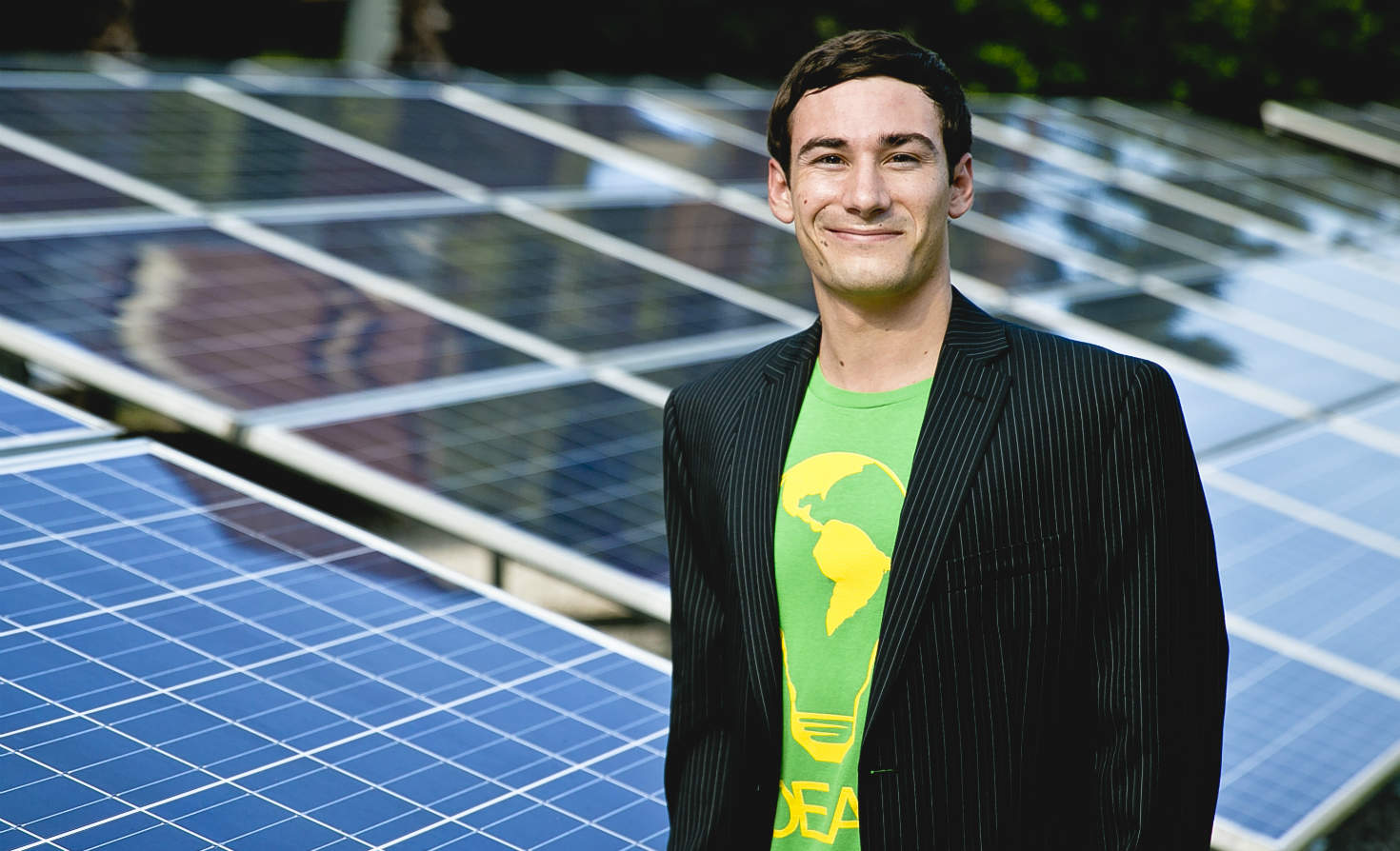
|
Chris Castro, City of Miami
An average week — particularly one that includes adequate sleep — is not easy to nail down for Chris Castro. As the senior energy advisor to Orlando Mayor Buddy Dyer, Castro has been arranging pilots of solar-powered self-driving cars on NASA runways and overhauling building efficiency standards. He’s also grown the community action nonprofit he started in college, IDEAS For Us, to 200-plus chapters while scaling an innovative lawn-to-organic-farm conversion program, Fleet Farming. Castro even squeezed in a keynote at the United Nations Rio+20 summit a few years ago. 'During the day, I’m working here full time in City Hall,' he said. 'In the evening and on the weekend… it’s more boots on the ground.' Castro, who is from Miami, has a unique vantage point. Orlando has a public focus on climate action, yet Florida lawmakers have been barred from discussing climate change — and he has become an evangelist for localized action. 'Our state legislatures and elected officials don’t believe in science,' Castro said. 'They are trying to maintain the status quo and halt any progress toward a clean economy.' Through efforts like Fleet Farming and the city’s recent $17 million green bond, he hopes to make Orlando part of a solution that includes business, government, academia and local residents. | ||
|
Prerna Chatterjee, 26
Sustainability Specialist, BASF North America; Florham Park, New Jersey | ||

|
Prerna Chatterjee, BASF
In her first job after college, Prerna Chatterjee recognized what most businesses don’t yet understand and her own employer, Oerlikon, didn’t see until she pointed it out: the business value of sustainability. She calculated that the energy savings in how Oerlikon’s newest products were manufactured cut carbon emissions by 26 percent — and furthermore, how that data could garner commensurate value in the marketplace. 'When I started my career, sustainability was a field where the tangibility and profitability of a business were perpetually questioned,' she said. Now she’s changing that. At BASF, she helps customers identify and pursue sustainability opportunities. She created a webinar series called ' Win$.' 'Prerna’s managerial skills and technical background help this young sustainability champion hunt, seek and drive business opportunities through the lens of sustainability,' says one of her supervisors. While a Columbia University graduate intern at Dow Chemical, Chatterjee did lifecycle analyses (LCAs) on the company’s Styrofoam plants, which Dow published as an Environmental Product Declaration (EPD). She said she’s determined to make environmental benchmarking the norm. 'Just as every packaged food has its own nutrition label today, I hope that every product has its own LCA and EPD one day.' | |
|
Angelica Ciranni, 29
Assistant Vice President, Sustainability Analyst, PNC Financial Services; Pittsburgh | ||

|
Angelica Ciranni, PNC
Pittsburgh has transformed from a tired steel mill town to a center of the green building movement, and two LEED Platinum buildings symbolize that change: the David L. Lawrence Convention Center and the Tower at PNC Plaza. Angelica Ciranni has been the public voice that educates the city on the significance of these buildings. She also keeps operations of the Tower at PNC Plaza in LEED compliance, overseeing the green building program within PNC’s Energy Management and Sustainability team. 'We see it as the crown jewel of our PNC LEED efforts,' Ciranni says of the tower, and she strives to keep it that way. 'We build these fantastic buildings but then it takes a whole lot of work to get them to work in the ways we intended.' What does that work involve? A supervisor describes what Ciranni puts into the effort: 'She is a jack of all trades who will get her hands dirty conducting a waste audit, will meticulously comb through spreadsheets of greenhouse data, will motivate dubious colleagues to change behavior, and will fluently present our vision to senior management.' Ciranni keeps pushing PNC buildings to operate at the top of their sustainability game, driving for ever-greater energy efficiency and water savings. | |
|
James Connelly, 29
Director, Living Product Challenge, International Living Future Institute; Seattle, WashingtonJames Connelly, ILFI | ||

|
When James Connelly was studying architecture at the University of Washington, he dreamed up what an ultra-green living building might look like. As it turns out, he now works in that building: downtown Seattle’s Bullitt Center, dubbed the greenest in the world. It includes design elements from his thesis.
'It’s pretty cool,' he said of the headquarters of his now-employer, the International Living Future Institute (ILFI). 'A lot of the concepts that we worked in in our design concept actually made it into the project.' Though Connelly cut his teeth in buildings, via a Fulbright Scholarship focused on green building rating systems in China, he also learned the ins and outs of supply chains while working at Boeing. At ILFI, he has combined those knowledge bases and honed a focus on transparency. First, he helped create Declare, a first-of-its-kind ingredient label for building materials. Now, Connelly has broadened his focus with the Living Product Challenge, consulting with both large and small companies to reimagine the way their products are designed, built and sold. The elusive question that keeps him going: 'Could the creation of every single product that a company makes provide a benefit for society?' | |
|
Christina Copeland, 27
Manager, Disclosure Services, CDP; New York City | ||
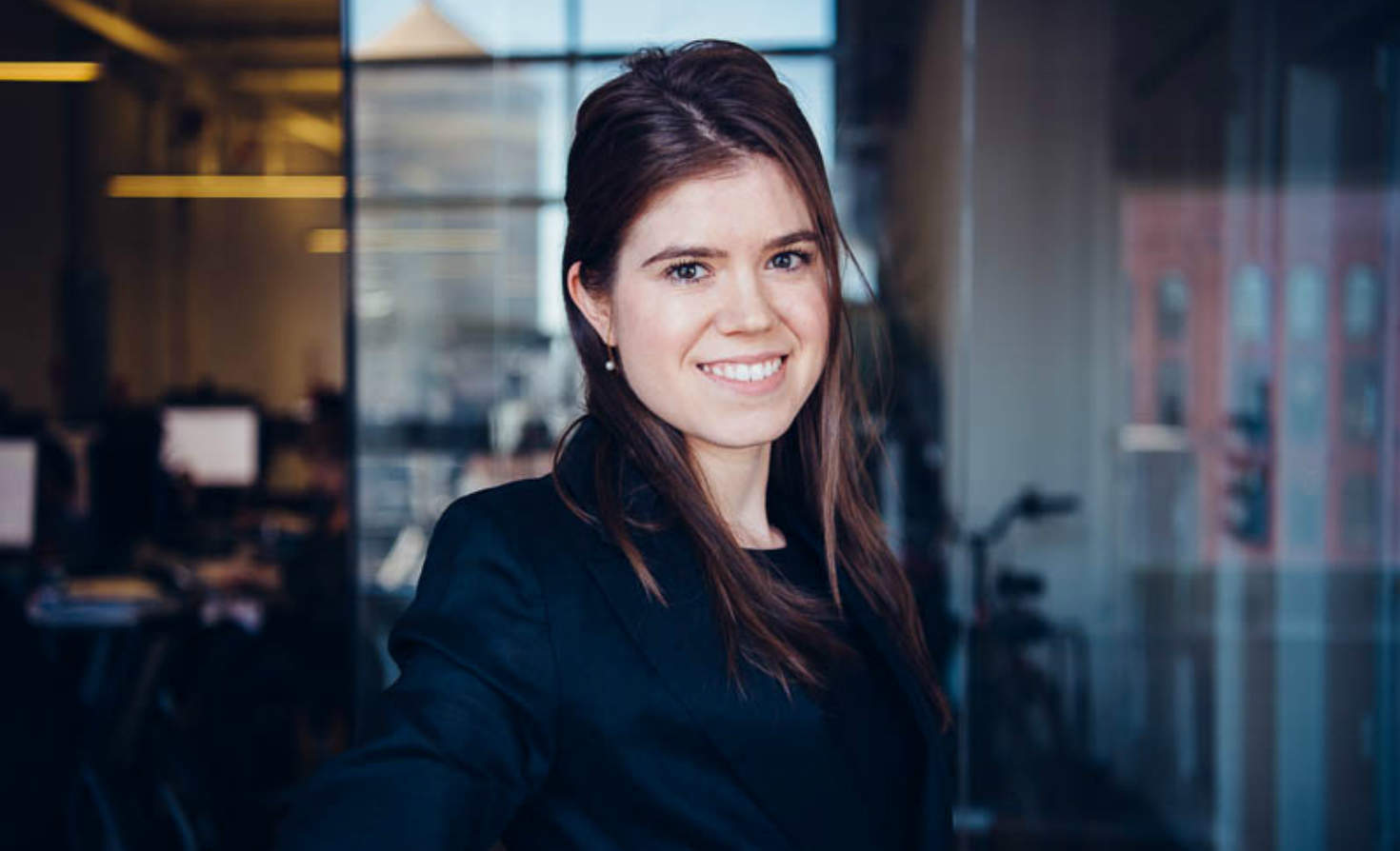
|
Christina Copeland, CDP
Over the four years since she joined CDP’s North American operation, Christina Copeland has become one of the organization’s foremost speakers on water security and stewardship — often addressing investor groups and environmental forums hosted by such organizations as the Inter-American Development Bank. Her interest stems from personal experience during a year-long assignment as a consultant with services firm Tata in Mumbai, India. 'I felt sheltered from water issues in my apartment, where I had a water filter attached to my sink,' Copeland recalled. 'Until about three months in, when my hair started falling out because I didn’t have a filter on my showerhead.' Technically, her job description is broader — helping U.S. and Canadian companies prepare climate, water and forestry disclosure statements. But Copeland believes the water crisis in emerging economies is 'a necessary action underpinning the solution of so many other issues such as disease, poverty and the transition to a low-carbon economy.' Copeland grew up in Hanover, New Hampshire, near the Appalachian Trail. She relishes the memory of morning crew boat sessions on the Connecticut River. Her future career emerged at Cornell University, where she interned for the school’s Department of Energy & Sustainability. She's been paddling hard ever since. | |
|
Lisa Curtis, 28
Founder and CEO, Kuli Kuli Foods; Oakland, California | ||

|
Lisa Curtis, Kuli Kuli
Does the world really need another energy bar? If it can help to 'create a world where malnutrition only exists in history textbooks,' then serve it up. That’s the goal of startup Kuli Kuli, named for a peanut snack in Niger, where Lisa Curtis served in the Peace Corps. The bars and drinks are the only ones to use the leaves of the nutritious moringa 'miracle tree,' and they’re already sold in Whole Foods stores. Curtis sources moringa from women-owned cooperatives in Ghana, and has partnered with the Clinton Foundation to plant the trees in Haiti. Sustainability is part of Kuli Kuli’s DNA. The Bay Area native said she aims to prove that 'a mission-driven company can plant trees, empower women and still earn a profit.' She says her productivity ramped up when she started jotting down positive thoughts instead of crossing off the each day on a calendar. What superpower does this superfood advocate dream of having? Teleportation to replace air travel — especially because she often needs to be in multiple places at once. The Whitman College graduate and former White House intern cut her teeth directing communications at solar financing startup Mosaic. | |
|
Miguel CuUnjieng, 28
Corporate Program Manager, Ceres; Boston | ||

|
Miguel CuUnjieng, Ceres
When Miguel CuUnjieng got a job out of college with the Philippines’ largest shopping mall development firm, SM Prime Holdings, he was grateful but suggested a different role: launching a sustainability program. The CEO gave him three months to prove the value of sustainability in real estate and shopping mall development. “It was truly a wild ride,” CuUnjieng recalls. 'I began managing the company-wide sustainability efforts,' including developing sustainability goals and metrics and a reporting plan. He won. SM Prime adopted sustainability into operations, which it continues to this day. CuUnjieng went on Georgetown University’s McDonough School of Business, then to the Coca-Cola Foundation, where he developed a geo-mapping digital communications strategy to build awareness about the foundation’s work and a social media strategy. Now he engages with Ceres’ banking and financial sector members. 'One such project involved evaluating carbon risk exposure in a client’s electric power portfolio,' which led the client to revise its global coal mining and coal-fired power investments, he said. As to long-term goals: 'I want to help establish the business case for sustainability as an unassailable position.' | |
|
John DeAngelis, 26
Energy Program Manager, Steelcase; Grand Rapids, Michigan | ||
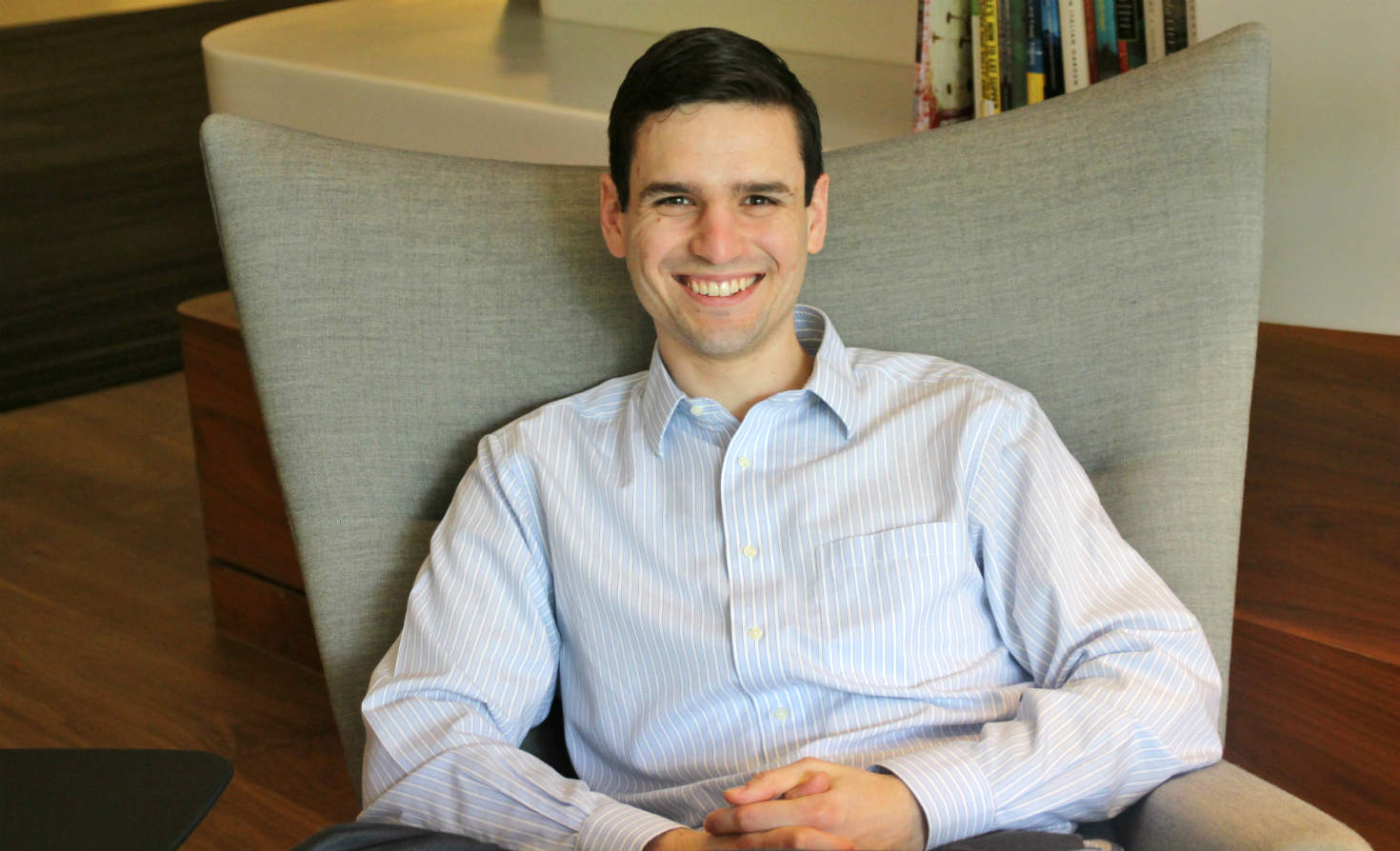
|
John DeAngelis, Steelcase
John DeAngelis grew up with an entrepreneurial bent in Fairfield, Iowa. Selling gelato in high school with his brothers enabled him to buy a car. 'Everybody wants to make money,' he said. 'That’s a great part of business. I wanted something more from business, and I wasn’t sure what that was.' So he pursued a unique program in sustainable business at Aquinas College in Grand Rapids, where he was originally torn between business administration, public policy and engineering. 'It kind of clicked that there was a way to do business that enhanced profits and the bottom line, but also deeply benefited local communities and the environment.' Compared to most corporations, furniture maker Steelcase has a sweeping sustainability infrastructure. DeAngelis, who started as an intern in procurement, said he’s surprised to lead high-impact projects so early in his career, including overseeing the company’s renewable energy portfolio and engaging deeply with energy policy in Michigan. Steelcase is a member of the RE100 coalition, counts more than 200 million Kilowatt-hours in its portfolio, and executed its first wind power buy in February without a broker. DeAngelis, who plays golf in his spare moments, said setting the ball rolling with quick wins is key to keeping huge commitments on track. | |
|
Joel Espino, 28
Environmental Equity Legal Counsel, Greenlining Institute; Berkeley, California | ||

|
Joel Espino, Greenlining Institute
Sustainability wasn't always Joel Espino's be-all, end-all career goal. Rather, the clean transportation-focused attorney with the California-based Greenlining Institute was inspired to help bridge environmental action with social equity after growing up the son of Mexican immigrants. 'Like most immigrant stories, things like poverty, discrimination, hard work and exploitation were constant themes for me growing up,' Espino said. 'This story is not unique. And that's what motivated me to do something about it.' His first career path was on racial justice-oriented public policy. But he credits a fellowship with his current employer for driving home an understanding of disproportionate environmental impacts. His focus now is ensuring that low-income communities and communities of color aren't left out of the shift to electric vehicles, working to ensure inclusion of equity requirements in state- and utility-driven EV charging pilots. Ultimately, Espino hopes to see 1 million EVs on the road in California by 2023, with access reaching broadly across demographics, embracing the increasing diversity of the state's population, rather than shying away from it. As for why the University of California Hastings College alum has chosen the legal route to effect that change? 'Legal rules have always been used to change or influence people's behavior,' he said. 'The thinking is that if you have a legal rule in place long enough, the resulting behavior change becomes the norm and changes collective values.' | |
|
Natasha Franck, 28
CEO and Founder, Etology; New York City | ||
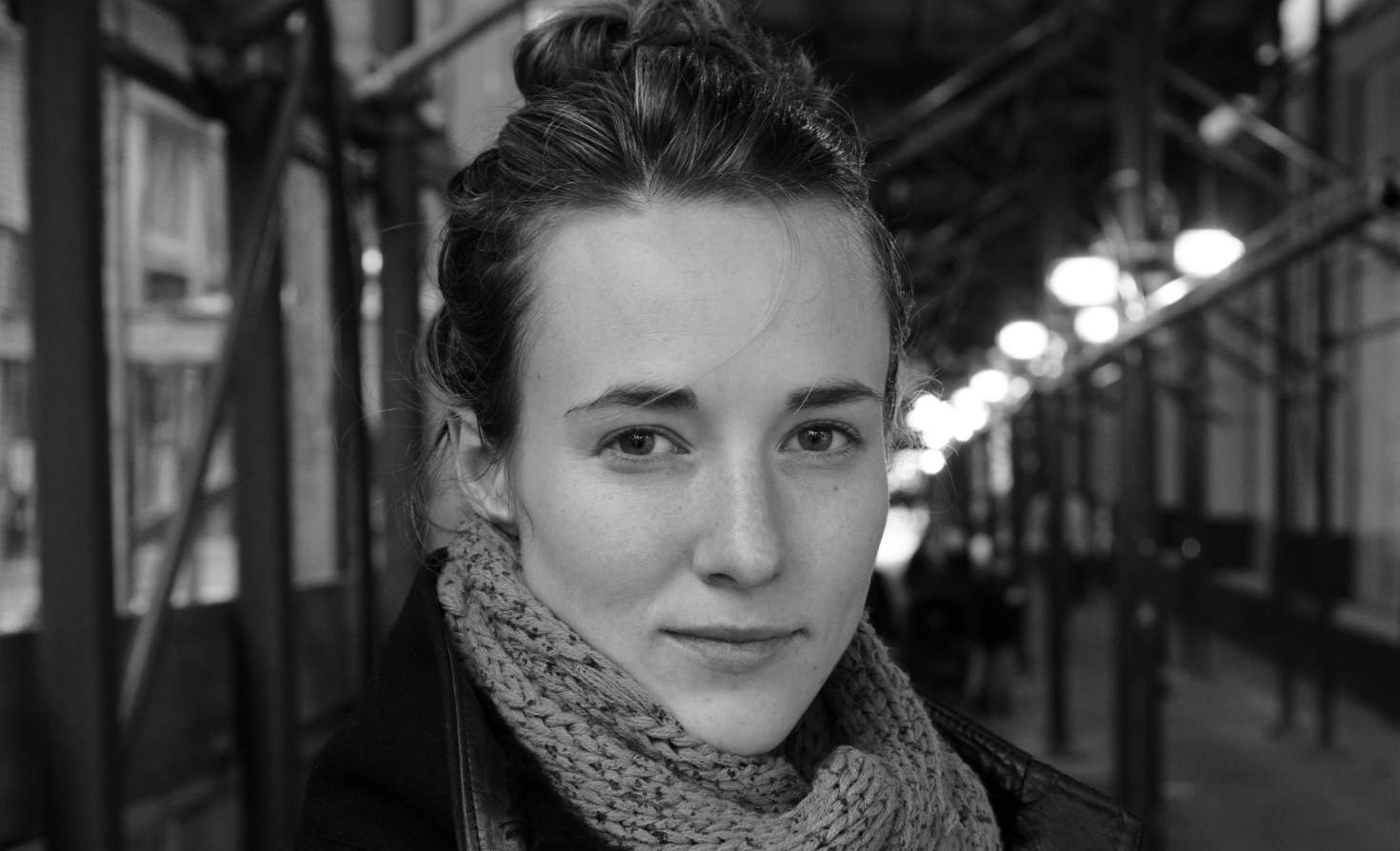
|
Natasha Franck, Etology
Natasha Franck was spending a lot of time in Beijing and Hong Kong as a Senior VP with the real estate consultancy Delos, working to blaze a trail for WELL-certified, healthy cities. Yet breathing foul air, 'experiencing whiteouts firsthand, being scared to leave the indoors,” she recalled, 'was staggering.” A realization that poor waste-management practices contribute to air pollution led in part to Franck’s next step. Her startup, Etology, seeks to create 'smart trash' that bridges the circular economy with the Internet of Things. The idea: Marry RFID-tagged goods with a database of ingredients and disassembly steps — then ensure the materials go to their highest, best use. Franck hopes supply-chain transparency will cure what plagues processes such as textile recycling. 'You can’t create useful materials if you don’t know the content,' she said. Yet it’s about much more than that: 'The idea of material reuse is really a next step of the sharing economy, how to level the limited resources we have to serve more people.' With its pilot platform, Etology is already working with major brands. Franck has her eye on sustainable apparel and consumer packaged goods, as well as the electronics and auto industries. And she’s partnering with circular economy leader the Ellen MacArthur Foundation. The born-and-raised Manhattanite and Georgetown University grad hopes her work ultimately 'contributes to smart cities as a tool for happiness.' | |
|
Emily Grady, 29
Manager, North America; World Business Council for Sustainable Development; New York City | ||

|
Emily Grady, WBCSD
'We don’t need more commitments' following the Paris Agreement, Emily Grady argues. 'The key is getting out of the mentality that the commitment is the achievement.' Her focus at the CEO-led World Business Council for Sustainable Development (WBCSD): How can companies create and share milestones as they try to tackle grand goals for renewable energy and eliminating waste? There, Grady helps member companies advance sustainability. Think of her work as an extension of the sustainability offices of the 40 North American corporate members. It includes advising the United Nations on the private sector’s role in its Sustainable Development Goals. The Yale University Masters graduate, who pursued a Fulbright scholarship in Argentina, sees translation as one of the core elements of her work. It's about translating the agendas of far-flung corporations, NGOs and governments to one another. It's also about translating U.N. priorities into business opportunities. 'It’s thrilling to work with people who see massive, wicked problems as bright, transformative opportunities, and are willing to make the heavy lift together,' Grady said. The Harlem resident credits many mentors with inspiring her career, and seeks to pay it forward by mentoring an eighth grader at the end of the day. | |
|
Janelle Heslop, 27
Senior Associate, Veolia; New York City | ||

|
Janelle Heslop, Veolia
Helping to transform New York City’s water utility, the largest in the nation, to be more energy efficient and resilient is par for the course for this consulting engineer. While an engineering student at Columbia University, Janelle Heslop worked during her summer break to bring renewable electricity to rural farming operations in Uganda as a program manager for Engineers Without Borders. Electricity changed the economic trajectory for those communities towards sustainability and wealth creation. Meanwhile, she graduated magna cum laude with distinction. It was hardly her first environmental achievement. As a 12-year-old, Heslop taught adults about water conservation and the role of wetlands as a volunteer junior docent for the Hudson Water Museum. But all that was yesterday. 'I'm really looking forward to a corporate world where 'sustainability' is not an employee program, a set of initiatives or a marketing campaign but rather a mindset — a standard way of thinking that's about people and net positive impact,' she said. 'I’m excited about how we can use climate change as an opportunity to work unilaterally across industries,' in an agenda that includes taking better care of the earth and 'promoting health, people and economic justice.' Heslop names Apple sustainability exec Lisa Jackson, the former EPA chief, as her role model. | |
|
Nikishka Iyengar, 26
Sustainability Strategist, Rubicon Global; Founder, The Guild; Atlanta | ||
|
|
Nikishka Iyengar, Rubicon Global
Mumbai. Singapore. Austin. Hong Kong. San Francisco. This globetrotter has called all five cities home in her short life. Nikishka Iyengar spent her childhood in India and university years in Texas. It wasn’t until Nikishka Iyengar moved to Atlanta in 2013 that she put down roots. By day, she is a sustainability strategist for waste management company Rubicon Global. Nights and weekends she nurtures her own venture, the Guild, a business incubator that caters explicitly to social enterprises. During her career at Rubicon and (previously) at Deloitte Consulting, Iyengar figures she helped businesses large and small “unlock $600 million of value” through the creation of more sustainable energy, water and waste strategies. Another impressive milestone: She helped create the Sustainable Maturity Matrix, a framework espoused by several large retailers. Don’t expect incremental thinking from Iyengar; she wants to move the needle. 'That’s why I focus a lot of my efforts into learning about and building on technology solutions to address environmental issues — it’s the quickest way to influence behavior change as well as systems change,' she said. 'I’d also like to know that I inspired and provided support to others to do the same.' | |
|
Jeffrey Jennings, 28
Sustainability Project Coordinator, Arizona Public Service; Phoenix | ||

|
Jeffrey Jennings, Arizona Public Service
With his dual interests in sustainability policy and corporate responsibility, it's fitting that Jeffrey Jennings finds himself on the front lines of the fast-moving energy industry at Phoenix-based power utility Arizona Public Service. He credits the interdisciplinary nature of sustainable business, which he experienced as an intern at Dell while pursuing a masters in science and technology policy, as a key motivator. The potential for real-world impact is another draw: 'I see energy as being a vital resource for society in general,' Jennings said. 'We’re definitely in a time of a lot of rapid change with distributed energy and other new technologies.' Hailing from Las Vegas, he is currently responsible for overseeing the utility’s climate reporting to groups like CDP. Jennings has also brokered partnerships with institutions including his alma mater, Arizona State University. Ultimately, the one-time accounting major hopes to help translate sustainability from a business add-on to a business necessity. 'Longer term, I really would hope to change people’s mindset about sustainability, from it being this kind of nebulous concept that some people seeing as not having much practicality to seeing it more as a business strategy or driving innovation,' he said. | |
|
Andrew Krioukov, 29
CEO and Co-founder, Comfy; Oakland, California | ||
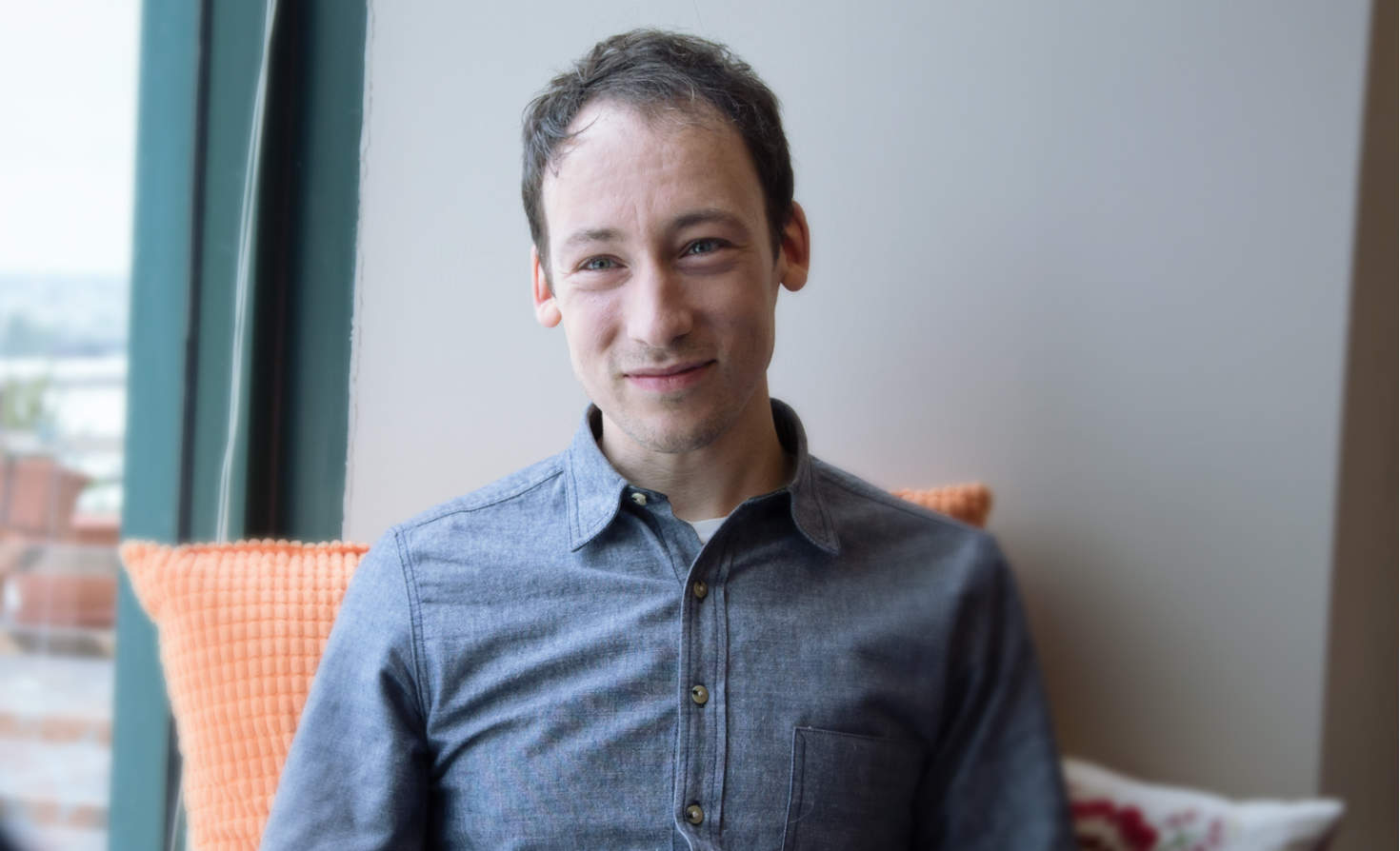
|
Andrew Krioukov, Comfy
Which is a more reliable gauge of building 'comfort,' humans or sensors? Andrew Krioukov thinks people should have the final say over gadgets. This, despite his credentials as a Ph.D. candidate in computer science at U.C. Berkeley and, subsequently, as a researcher for high-tech giants Google, IBM and Intel. Krioukov’s three-year-old startup’s mobile app, called Comfy (until recently known as Building Robotics), uses feedback submitted by building occupants to guide adjustments to heating and cooling equipment. The idea grew out of a project while at Berkeley, with co-founder Stephen Dawson-Haggerty. Fast forward. His software has been tested at Google and Johnson Controls, and as part of the General Services Administration’s Green Proving Ground program. Do human sensors work? GSA models suggest Comfy could cut energy consumption related to air conditioning by up to 20 percent, and up to 47 percent for heating systems. So far, venture capital investors have put up nearly $8 million to help Krioukov and company. 'We’ve been waiting for something like this for a while,' said Peter Rumsey, senior fellow at Rocky Mountain Institute and an investor in Comfy. | |
|
Jill Lennartz, 29
Principal, Corporate Social Responsibility, CA Technologies; Framingham, Massachusetts | ||

|
Jill Lennartz, CA Technologies
This self-described computer nerd and science geek has a thing for data. As a masters student at the University of New Hampshire, Jill Lennartz was part of a research team that hacked together sensors and software to measure and analyze the release of methane 'bubbles' trapped in wetlands — a key indicator of climate change. 'I grew up with spare robotics parts scattered around the house,' she noted in a story about the NASA-funded project. Not surprisingly, Lennartz’s first real-world employer was hungry for her field experience but her current position at software company CA also draws on her love of public speaking. Aside from handling data collection and reporting, Lennartz is often called upon to represent her employer at meetings of the United Nations Global Compact, Global Compact USA Network and the Clinton Global Initiative. 'It is not lost on me that I am frequently the youngest person at the table, but I am proud to represent my generation with a capable and determined voice for the future of sustainability,' she said. | |
|
Sara Lindenfeld, 27
Sustainability Analyst, JetBlue Airways; Long Island City, New York | ||

|
Sara Lindenfeld, JetBlue
Climate action runs in the blood for Sara Lindenfeld, who learned from uncle Stephen Schneider, a world-renowned climate scientist. 'While in college, I had the honor of working for him at Stanford analyzing climate change impacts,' Lindenfeld recalled. 'He taught me the importance of understanding the complex science behind environmental issues, as well as being able to communicate it.' She has parlayed that scientific background into a role as a sustainability analyst for JetBlue, tackling projects like the electrification of ground-support vehicles used at airports. Devising a plan for better on-board recycling while cruising at 35,000 feet was another highlight. When she’s not dreaming up new approaches to the aviation business, Lindenfeld stays busy exploring with her dog and loves riding camels. The influence of her uncle’s quantitative research is still evident in the way she thinks about her own career goals. 'I’ve been keeping an approximate running tab of (greenhouse gas) emissions avoided in a business operation thanks to my specific projects or those I have supported on,' she said. 'Currently I’m aiming for 1 million metric tons.' | |
|
Liz Lowe, 29
Innovation Lead, Sustainability & Corporate Responsibility; Adobe; San Francisco | ||

|
Liz Lowe, Adobe
Adobe can thank Liz Lowe in part for being ahead of the curve on sustainability perks. The software giant draws on a long tradition of greening its buildings and data centers. Over the past year, the maker of Photoshop and Acrobat has gone further, making a 100-percent renewable energy pledge and aligning corporate sustainability strategy with employee engagement. Through Lowe and her team, Adobe offers incentives for its apartment-renting interns and home-owning managers alike, such as new support for carpooling via the Waze app and kits for apartment energy-savings, as well as discounts on electric cars and solar panels. Solar discounts even extend to employees abroad. Lowe said positive psychology, not guilt, inspires behavior change. And the more her co-workers adopt such measures personally, the more they help Adobe drive sustainability forward. 'We’re not asking for extra time and money, but providing ways for them to integrate behavior change into their daily lives'” said Lowe, who leads yoga classes in her spare time. The Berkeley MBA and Palo Alto native said stints at GOOD Corps and Merrill Lynch underscored how to make the business case for sustainability. A Peace Corps assignment in Costa Rica highlighted how her personal actions affected the environment. | |
|
Jessica O. Matthews, 29
CEO and Founder, Uncharted Play; New York City | ||

|
Jessica O. Matthews, Uncharted Play
Creating clean energy can be fun and games — literally. That’s what Jessica O. Matthews realized when she invented the SOCCKET ball. Access to clean and reliable energy is a global problem that Matthews has long had on her mind. In her junior year at Harvard University, Matthews sought a solution by creating an energy-generating soccer ball, which harnessed the kinetic energy created from play and turned it into an off-grid source of electricity to light a lamp. Matthews went on to found Uncharted Play to scale the SOCCKET ball with an even bigger mission: to distribute the balls to those without access to electricity — particularly clean and reliable sources of energy. Her invention won accolades not only from Harvard, but from President Barack Obama as well as Forbes, Fortune and Black Enterprise magazines. 'She’s the Elon Musk of kinetic energy,' said White House Chief Technology Officer Megan Smith. The size of this market? Well, 1.2 billion people worldwide lack access to electricity. But just about every kid in the world plays soccer. Matthews is well on her way to scoring points for them all. An even bigger win: embedding the technology into anything from clothing to suitcase wheels and beyond, turning everyday objects into wireless microgenerators. | |
|
Divya Natarajan, 28
Senior Project Manager, Paladino and Company; Washington, D.C. | ||

|
Divya Nataranjan, Paladino and Company
Divya Natarajan handles the sustainability aspects of high-profile real estate developments, most notably New York City’s new World Trade Center towers. As a consultant with green building innovator Paladino, she already counts 1.5 million square feet of LEED projects in her portfolio. The blueprint for Natarajan's career is what she calls 'an abundance approach' — a belief that we already have what we need to solve major challenges ahead. With this holistic, positive outlook, she passed the GRI G4 exam and became one of the first people to achieve WELL AP certification, both over the past year. Natarajan came to Cornell University from Chennai, India, for a Masters in Sustainable Design Studies. She found it hard to pursue architecture that lacked a positive impact, being driven to 'create healing and productive spaces.' Natarajan relishes living in Washington, D.C., and labors on 'dream projects' every day. Yet she also imagines upending building design to work directly with end users on creating a solution, 'like a living incubator process,' that would adjust every few years to match people’s evolving vision and values. Natarajan foresees teaching in her future. 'My greatest accomplishment would be to help the next generation realize their own potential for change.' | |
|
David Poritz, 27
President and Co-founder, Equitable Origin; Mexico City and New York City | ||
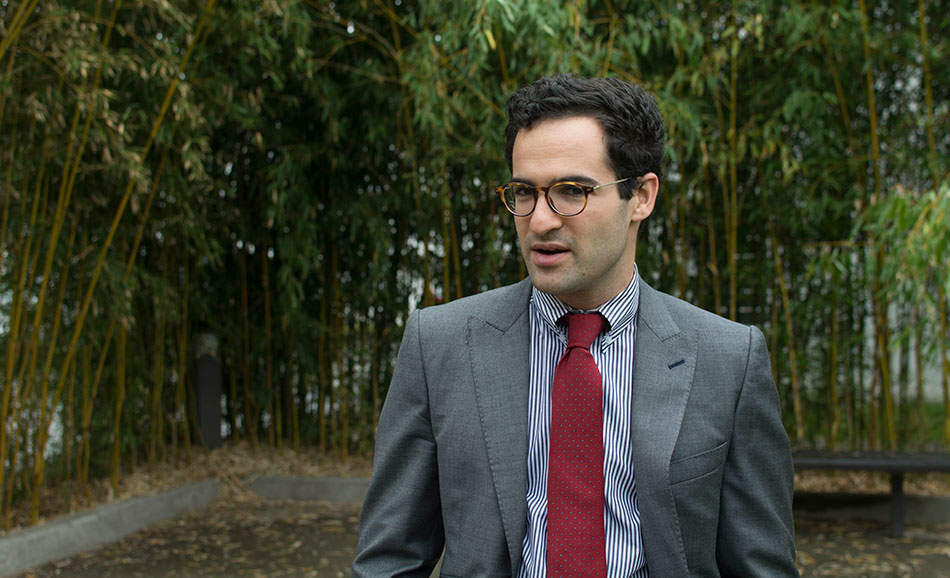
|
David Poritz, Equitable Origin
Tom Sullivan
While his middle-school classmates were at summer camp, David Poritz was hanging out with indigenous communities in the Amazon. Seeking to help people who suffered environmental, social or economic harm by oil and gas projects there, he created the first sustainability standards for energy exploration while a student at Brown University. His startup, Equitable Origin, has set its sights beyond reducing not just the impacts of mining for fossil fuels but also setting a baseline for renewable-energy projects. 'Just because a project theoretically produces green energy doesn’t mean it leaves no trace,' Poritz said, explaining that anything at utility scale can have a blockbuster social and environmental influence, especially with wind and solar farms often near indigenous lands. Major renewables companies are considering Equitable Origin’s certification system. Poritz also seeks to work with technology brands and manufacturers with large energy footprints. The Rhodes Scholar grew up in Massachusetts and splits his time between the U.S. and Mexico, where his company is working with national oil company Pemex on a social impact assessment using Equitable Origin's EO100 standard. Equitable Origin also recently partnered with Mexico’s largest coalition of universities. One of his biggest surprises has been finding allies in unexpected places: 'Keep an open mind with whatever stakeholder you’re dealing with.' | |
|
Kyle Tafuri, 29
Senior Sustainability Advisor, Hackensack University Medical Center; Hackensack, New Jersey | ||

|
Kyle Tafuri, Hackensack UMC
Born into a family of lawyers and judges, Kyle Tafuri opted for a career in sustainability after reading Patagonia founder Yvon Chouinard’s 2005 book, 'Let My People Go Surfing.' He literally wrote his own job description at HackensackUMC after interning for the hospital system as part of his master’s project for nearby Ramapo College. Turned out to be a good fit. Thanks in part to Tafuri's work, HackensackUMC has figured prominently on Practice Greenhealth’s list of the top 25 most environmentally conscious U.S. healthcare facilities for the past three years. It was also one of 11 hospitals invited this year to a White House-hosted discussions about climate change. One of Tafuri’s most groundbreaking projects: a push to eliminate flame retardants in beds and other furniture, while still meeting fire-safety regulations. “We were hit with every brick wall possible, but we just kept pushing,” Tafuri said, describing what has become a crusade for safer chemicals. Tafuri's latest cause: Making sure meat purchased for HackensackUMC’s cafeterias and meals services is antibiotic-free, despite resistance from distributors and suppliers satisfied with business as usual. | |
|
Tiffany Tran, 24
Sustainability Associate, Annie's division of General Mills; Berkeley, California | ||

|
Tiffany Tran, Annie's
Organic food is soaring in popularity and sales, but it doesn’t hurt to have a sustainability booster like Tiffany Tran behind your product to engage people in its benefits. Annie’s, perhaps best known for its boxed mac and cheese, grew sales of its certified organic products by 9 percent last year, and Tran’s evangelizing on social media has been part of the story. Tran recently won the #Findorganic competition at the Natural Products Expo West trade show. Inside Annie’s, which General Mills acquired in 2014, Tran drives sustainability initiatives to reduce its carbon footprint, trace and measure metrics and educate employees. She has galvanized support for sustainable lifestyle choices, getting 73 percent of employees to attend her in-house sustainability events. In short, she is Annie’s sustainability evangelist. 'Since I was a junior in college, I knew that I wanted to pursue a career where I could make a positive impact on the environment,' she said. Nobody who has known Tran for a long time is surprised. As co-worker Molly Janis said, 'She got her start educating and inspiring her peers at Cal Berkeley just a few short years ago,' as residential sustainability coordinator. Even still, Tran educates and inspires other millennials as a volunteer on the leadership team of Net Impact San Francisco. | |
|
Jason Tschanz, 27
Environmental Integration Project Manager, Walt Disney Parks & Resorts; Orlando, Florida | ||

|
Jason Tschanz, Disney
Jason Tschanz’s decision to take environmental economics as a University of South Florida undergraduate came down to scheduling: It was the only class that fit into his academic workload. But there he learned the value of expressing strategies for zero waste, composting and water conservation as well-supported financial arguments. 'I developed my passion for sustainability work through the projects we worked on during the class,' he said, recalling his late mother’s advice to pick a field he enjoyed. 'I then knew where I wanted to take my career.' On paper, his first role at Disney had nothing to do with environmental policy or sustainable business practices; he joined as a pricing analyst. Barely two years later, Tschanz played a critical role in establishing environmental impact reduction targets for a massive operation the size of a small city — one spanning almost 44 square miles — including 27 resorts, four theme parks and 28,000 guest rooms. His pioneering work included creating an electric-vehicle charging network and developing composting strategies for Disney restaurants. Tschanz, who is earning his MBA, regularly shares what works with other Disney 'cast members' — armed with the data to prove his case. 'I think there is a way to influence people from a business side that I don’t think people have tapped into enough yet,' he said. | |
|
Tai Ullmann, 29
Sustainability Manager, Land O’ Lakes; Arden Hills, Minnesota | ||

|
Tai Ullman, Land O' Lakes
Not having grown up on a farm, how did Tai Ullmann find herself leading the on-farm sustainability program for one of the largest dairy producers in the U.S.? 'I really wanted to work with producers,' she said. Ullmann completed her bachelors degree at American University with aspirations to become an environmental lawyer, but experience working on global climate policy left her wanting. 'I just felt really removed from where the impact was happening. You spend all this time on policy work just to have policy changed, or it never gets passed.' At a cooperative that includes 2,259 dairy producers — ranging from two cows to 5,000 — managing sustainability for Land O'Lakes has the scale of impact Ullmann desired. The task is daunting not only due to the sheer number of dairies, but also for the challenge of creating metrics and solutions that work for different sized farms. Her M.S. from Tufts in food, agriculture and the environment should help. 'The most exciting thing is this growing collective desire to continually improve the sustainability of feeding a growing population' said Ullmann, describing of her optimism for the future of agriculture. 'I would love to lead that growing desire to help improve the productivity of agriculture while decreasing our impact on the environment.' | |
|
Josh Wiener, 26
Director of Global Sustainability, MetLife; Bridgewater, New Jersey | ||
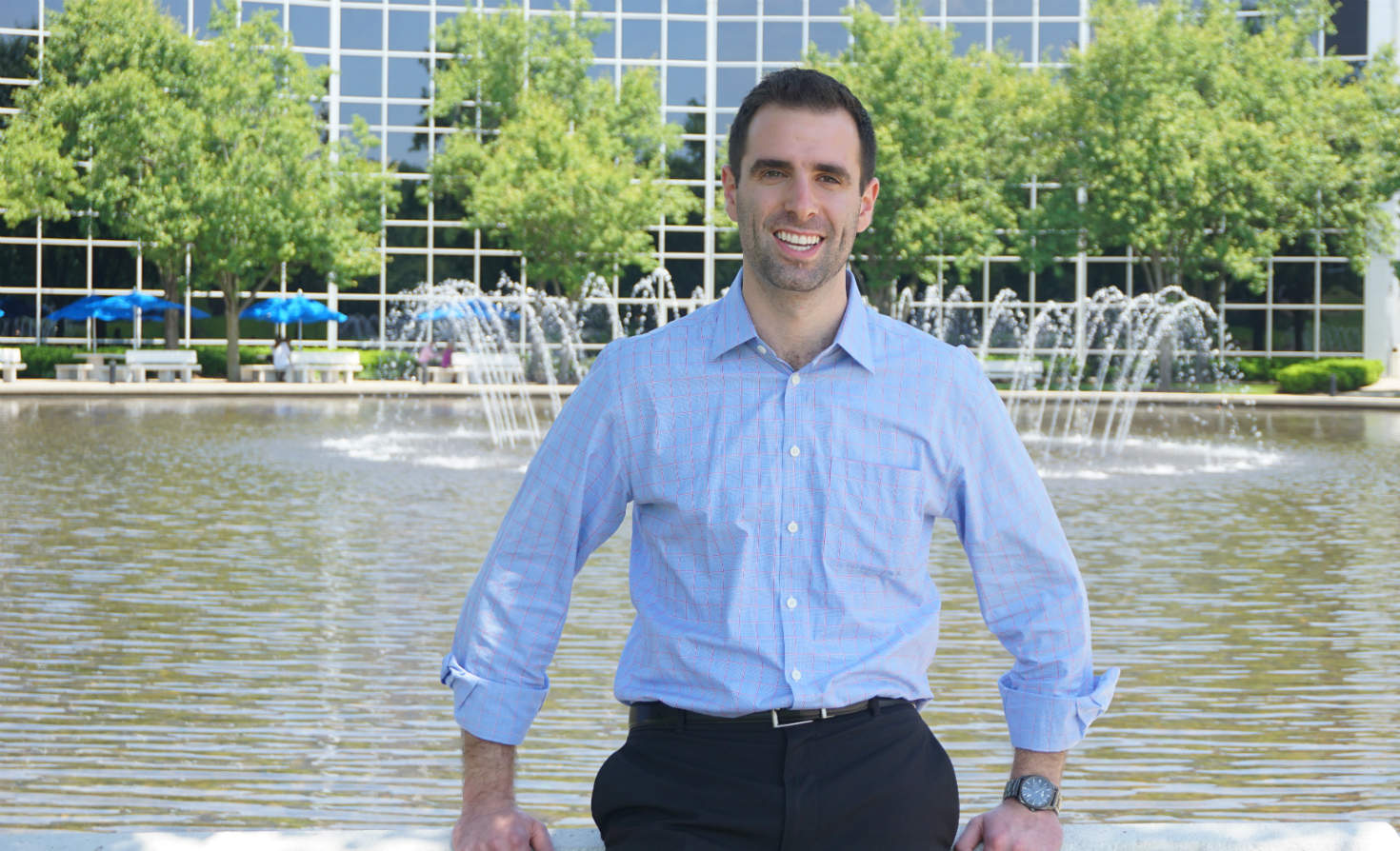
|
Josh Wiener, MetLife
MetLife has $474 billion in assets under management and 100 million customers. So it may seem heady for a 26-year-old to be leading sustainability at such a behemoth. Josh Wiener started an an intern and then was hired as the first employee to focus solely on corporate sustainability. Now he manages the carbon footprint of all MetLife offices, drives the company’s supply-chain sustainability and cultivates employee engagement in these efforts. He's not stopping there. His ambition is to further increase MetLife’s sustainability reach. 'This year we got the approval from the CEO and executive board for MetLife to become carbon neutral by the end of the year' in global operations and business travel, he said. Yet Wiener considers his biggest accomplishment to be the roll-up-your-shirt-sleeves task that got these things going: 'leading the research, identifying best practices and getting they buy-in' for MetLife’s environmental goals. MetLife, recognizing a sustainability mover and shaker, has given Wiener increasing responsibility. In the past few years, his role evolved from supporting real estate emissions tracking to driving sustainability strategies across procurement, real estate and supply chains. And yet he has spare time — enough to found the New York Area Sustainability Group and to help out on Hoboken's green team. | |
— Written and edited by Heather Clancy, Elsa Wenzel, Barbara Grady, Lauren Hepler, Sureya Melkonian and Joel Makower, with research support from Shana Rappaport and Elaine Hsieh